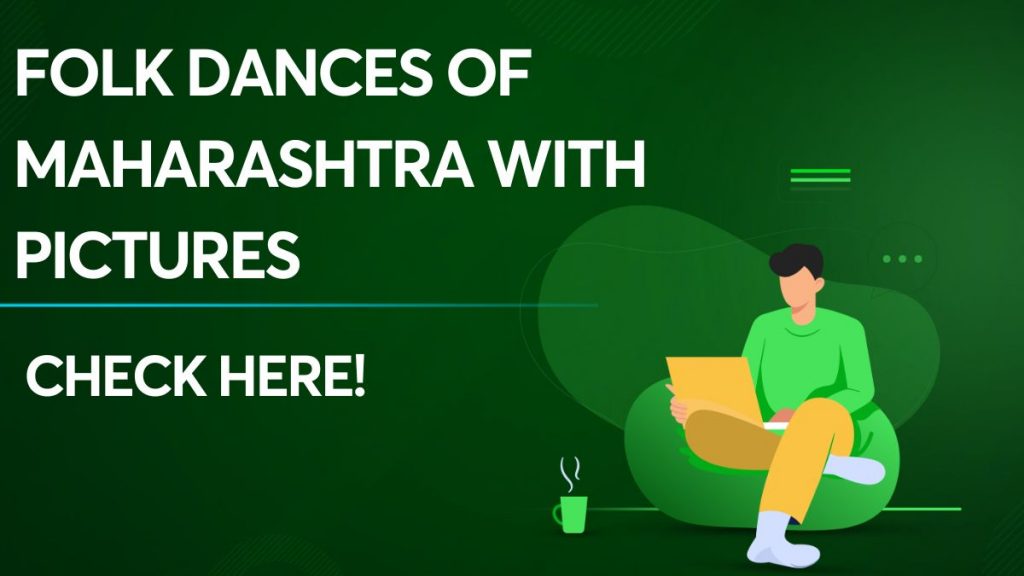Maharashtra, with its rich culture and customs, features a variety of folk dance forms. Povada is a dance form that celebrates the lifetime accomplishments of Maratha emperor Shivaji Maharaj. The mesmerizing music and rhythmic dances of Lavani and Koli’s dance traditions captivate Maharashtrians.The Dhangars of Sholapur perform the Dhangri Gaja dance in honor of their God. Dindi and Kala are religious folk dances that portray Lord Krishna’s spiritual rapture. Tamasha is a Maharashtra folk dance that is prevalent throughout the state. Read the below article as this article will going to tell you about the major important Folk Dances of Maharashtra with Pictures.
Important Folk Dances of Maharashtra
Check the several Important Folk Dances of Maharashtra from the below table.
| Dance Style | Description |
|---|---|
| Lavani | Lavani is a vibrant and energetic folk dance form from the state of Maharashtra, India. It is known for its lively music, rhythmic movements, and expressive storytelling. Lavani dancers, predominantly women, wear colorful traditional attire and perform intricate footwork and graceful hand gestures. |
| Koli | Koli dance is a popular folk dance from the coastal regions of Maharashtra, primarily performed by the Koli community. It is inspired by the lives and activities of fishermen and portrays their joy, enthusiasm, and unity. Koli dancers, both men and women, dress in traditional attire adorned with vibrant colors and jewelry. |
| Tamasha | Tamasha is a traditional folk dance-theater form from Maharashtra, known for its entertaining and satirical performances. It combines elements of dance, music, and dramatic storytelling. Tamasha dancers, accompanied by musicians, perform energetic dance sequences while singing and enacting scenes from folk tales or social situations. |
| Dindi | Dindi is a devotional dance form associated with the worship of Lord Vitthal, a popular deity in Maharashtra. It is performed as a part of the annual Pandharpur Yatra pilgrimage. Dindi dancers, known as “warkaris,”. |
Folk Dances of Maharashtra with Pictures
The people of Maharashtra celebrate an outsized number of fairs and festivals and dancing, is an element of the celebration, maybe a feature that is common in almost all of them. You can read the several Folk Dances of Maharashtra in the below section.
Lavani
Lavani comprises the weather of both, a standard song, and folk dance. The dance was performed to the beats of ‘Dholak’, a drum-like instrument, mainly by women. it’s a wonder how these women, draped in heavy nine-yard saris, manage to perform the dance movements with such elegance. Within the earliest days, the dance form was wont to highlight the various aspects of the society like religion, politics, romance, etc. within the 18th and 19th centuries, it came to perform to entertain also as motivate the tired soldiers of Maratha battle.
Koli Dance
Koli Dance, as the name suggests, was performed by the fishermen of Maharashtra – referred to as Kolis. Their colorful attire, cheerful personality, and distinct identity are considerably reflected in their dance form too.
The participants of this dance comprise both men and ladies, who were divided into two separate groups. one of the most popular movements in the Koli dance is that of the hand because it moves while rowing a boat.
Dhangari Gaja
The Dhangars, a community of shepherds from Maharashtra’s Sholapur district, are famous for their Dhangari Gaja dance. Because their lives revolve mostly around nature and its different forms, the poetry on which the dance is based reflects this. It is composed of couplets, several of which tells the story of the birth of their God ‘Biruba’ and are known as ‘Ovi’. The main reason for doing this dance is to appease the Gods.
Povadas Dance
Povadas is especially a form of a ballad, which revolves around the incidents surrounding the life of the great Maharashtrian leader, Chhatrapati Shivaji Maharaj. the good ruler has always held a reverential position in the hearts of the Marathi people and even through these ballads; they seek to remember the great leader and his glorious life.
Tamasha
Tamasha, the word sense fun or entertainment, is the name given to the folk theater of Maharashtra. The dance form seems to possess influenced by several dance forms. Some scholars also believe it to reflect “Prahsana” and “Bhana” sorts of Sanskrit drama.
Tamasha especially performed on love songs known as ‘Lavanis’. most instruments used for providing betas are the Dholki drum, ‘Tuntuni’ (a single string instrument), ‘Manjeera’ cymbals, ‘Daf’ (a tambourine-like instrument), ‘Halgi’ (smaller Daf), etc.
Dindi
Dindi is another Maharashtra folk dance that is performed on the Ekadashi day of the Hindu month of Kartik. The dance is based on Lord Krishna and his mischievous, fun personality. It’s essentially a religious dance performed to the sounds of a little drum called Dindi. While performing the dance moves, the dancers encircle the musicians.
Folk Dances of Maharashtra FAQs
Maharashtra has a rich tradition of folk dances. Some popular folk dances of Maharashtra include Lavani, Koli, Gondhal, Tamasha, Povada, Kala, and Dhangari Gaja.
Lavani is a vibrant and energetic folk dance form that originated in Maharashtra. It is performed to the beats of traditional musical instruments like dholki and tuntuna. Lavani is characterized by fast footwork, graceful movements, and expressive facial expressions. It often depicts themes of love and devotion.
Koli dance is a traditional dance form of the Koli community, who are the fishermen in Maharashtra. It is performed during festivals and celebrations. Koli dance involves rhythmic movements and footwork, accompanied by traditional songs and music.
Gondhal is a traditional folk dance-drama form of Maharashtra. It is performed to honor and worship the deity Gondhal Devi. Gondhal dance involves storytelling through dance and music, depicting mythological or historical events.
Povada is a folk dance form that is popular in Maharashtra. It is performed to narrate the heroic tales and valor of Maratha warrior king Chhatrapati Shivaji Maharaj. Povada dance involves rhythmic movements and expressive gestures, accompanied by singing and music.
